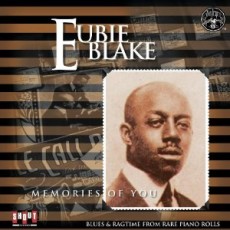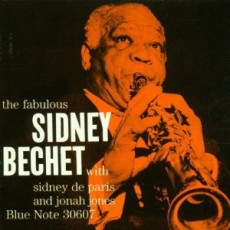
Daily Dose Of Jazz…
James Hubert Blake was born on February 7, 1887 in Baltimore, Maryland to former slaves and was the only surviving child of eight. Blake’s musical training began when he was just four or five years old when he wandered into a music store, climbed on the bench of an organ, and started “fooling’” around. The store manager recognized his genius, told his mother and subsequently bought an organ.
At seven, he received music lessons from the Methodist church organist, by fifteen he played piano at Aggie Shelton’s Baltimore bordello and got his first big break in the music business when world champion boxer Joe Gans hired him to play the piano at Gans’ Goldfield Hotel, the first “black and tan club” in Baltimore in 1907. In 1912, Blake began playing ragtime in vaudeville with James Reese Europe’s “Society Orchestra” which accompanied Vernon and Irene Castle’s ballroom dance act. Shortly after World War I, Blake joined forces with performer Noble Sissle forming the vaudeville music duo, the “Dixie Duo” that transformed into 1921’s “Shuffle Along”, the first hit musical on Broadway written by and about African-Americans.
Throughout his career Blake made three films with Sissle for Lee DeForest’s Phonofilm Sound-On-Film, later played the Boathouse nightclub in Atlantic City, was bandleader with the USO during World War II, with his career winding down in 1946 enrolled and graduated from New York University, revived in 1950 with new interest in ragtime as artist, historian and educator, received the Presidential Medal of Freedom from President Reagan, awarded numerous honorary doctorates and had another hit Broadway play “Eubie!” in his honor. Eubie Blake continued to play piano and record until his death on February 12, 1983 in Brooklyn, New York. He was 96.
More Posts: piano

Daily Dose Of Jazz…
Charles “Buddy” Bolden was born on September 6, 1877 in New Orleans, Louisiana and is regarded as a key figure in the development of a New Orleans style of ragtime music that would later come to be known as jazz.
He was known as “King Bolden” and his band was a top draw in New Orleans from about 1900 until 1907, when he was incapacitated by schizophrenia. He left no known surviving recordings, but he was known for his very loud sound and constant improvisation. Instead of imitating other cornetists, Bolden played music he heard “by ear” and adapted it to his horn. In doing so, he created an exciting and novel fusion of ragtime, black sacred music, marching-band music and rural blues.
He rearranged the typical New Orleans dance band of the time to better accommodate the blues; string instruments became the rhythm section, and the front-line instruments were clarinets, trombones, and Bolden’s cornet. Bolden was known for his powerful, loud, “wide open” playing style.
While there is substantial first hand oral history about Buddy Bolden, facts about his life continue to be lost amongst colorful myth. Stories about him being a barber by trade or that he published a scandal sheet called The Cricket have been repeated in print despite being debunked decades earlier.
Bolden suffered an episode of acute alcoholic psychosis in 1907 at the age of 30. With the full diagnosis of dementia praecox, he was admitted to the Louisiana State Insane Asylum at Jackson, where he spent the rest of his life until November 4, 1931 at age 54.
More Posts: cornet

Daily Dose Of Jazz…
Jaki (John) Byard was born on June 15, 1922 in Worcester, Massachusetts and began playing professionally at age 15. Adept not only on the piano, he played trumpet and saxophone among other instruments. After serving in WWII he toured with Earl Bostic in the late 40s, based himself in Boston and had his recording debut with Charlie Mariano in 1951.
Known for his eclectic style, Byard added everything from ragtime to free jazz in his delivery. Through the fifties and into the sixties he was a member of Herb Pomeroy’s band followed by a stint with Maynard Ferguson.
Moving to New York, Byard recorded extensively with Charles Mingus from 1962 to 1964 and in 1970, touring Europe with him in 1964. He also made important recordings as a sideman with Eric Dolphy, Booker Ervin and Sam Rivers.
As a leader, he recorded a string of albums for the Prestige label during the 1960s and fronted an occasional big band, the Apollo Stompers. He taught at the New England Conservatory, Manhattan School of Music, Hartt School of Music, and the New School for Social Research.
Jaki Byard was shot dead on February 11, 1999 in New York City. The circumstances surrounding his death have not been determined. Phil Woods described him as “one of the most compelling and versatile pianists in jazz”.

Daily Dose Of Jazz…
Sidney Bechet was born on May 14, 1897 in New Orleans, Louisiana to a wealthy Creole family. At age six he picked up his brother’s clarinet, learned to play by on his own, eventually playing at a family birthday party exhibited his new talent. Later he would study with renowned Creole clarinetists Lorenzo Tio, Big Eye Louis Nelson and George Baquet. He would be found improvising jazz in many New Orleans ensembles led by John Robichaux, Bunk Johnson and King Oliver.
By the time he was 17 Bechet was touring as far north as Chicago and two years later landed in New York playing with Marion Cook’s Syncopated Orchestra. This led him to Europe and the Royal Philharmonic Hall where he attracted attention with his playing. It was in London that Sidney found the straight soprano and quickly developed a style different from his warm clarinet.
Sidney became one of the first important soloists in jazz, eclipsing Louis Armstrong into the studio by several months, and was possibly the first notable jazz saxophonist. His forceful delivery and well-constructed improvisations characterized his distinctive and wide vibrato playing although his lively and unpredictable temperament did not gain him wide acclaim until well into the late forties.
Returning to New York in 1922 he began recording songs like “Wild Cat Blues” and “Kansas City Man’s Blues” with sessions led by pianist and songwriter Clarence Williams. Over the next three decades Bechet continued to record and tour although his success was intermittent. He relocated to France in 1950, got married and shortly before his death dictated his poetic autobiography “Treat It Gentle”. Sidney Bechet, clarinetist, saxophonist and composer died in Garches, France of lung cancer on May 14, 1959, his 62nd birthday.

Daily Dose Of Jazz…
Paul Lingle was born on December 3, 1902 in Denver, Colorado and began on piano at age six. He first played professionally in the San Francisco area in the 1920s, later becoming a local legend in the Bay area in the Forties. He often accompanied Al Jolson in the late 1920s, including recording for his film soundtracks.
In the 1930s Paul worked mainly on radio, and also played with Al Zohn’s band. He tuned pianos early in the 1940s and worked as a soloist in local San Francisco clubs, accompanying visiting musicians such as Leadbelly and Bunk Johnson.
Lingle moved to Honolulu, Hawaii in 1952, where he played until his death on October 30, 1963. A talented stride pianist that also played ragtime, he released almost no recorded material during his lifetime, doing only one session for Good Time Jazz in 1952. Euphonic Records posthumously released several volumes of private recordings that were critically acclaimed.
More Posts: piano


